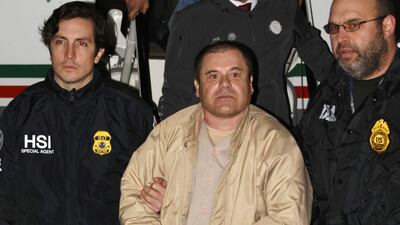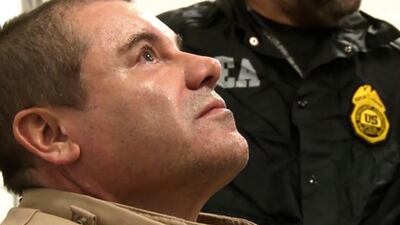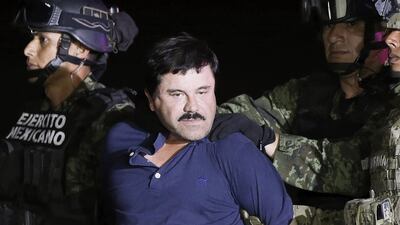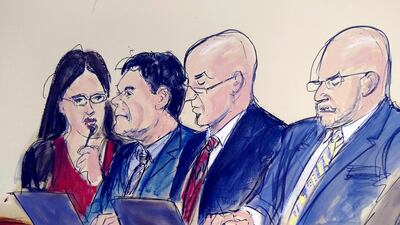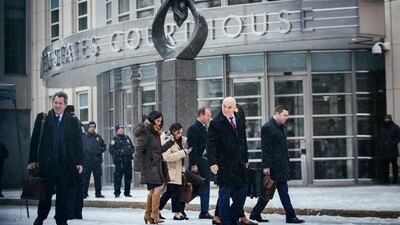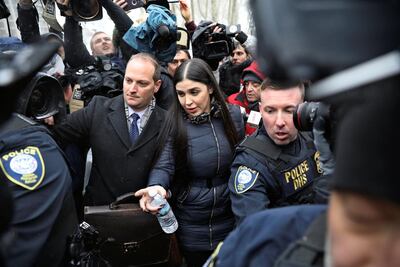A US jury on Tuesday convicted the notorious Mexican drug lord Joaquin “El Chapo” Guzman on all 10 charges of drug trafficking and criminal enterprise at the end of a 13-week trial.
Guzman, 61, now faces spending the rest of his life in a maximum-security prison with no prospect of the sort of escape that made him a celebrity in Mexico.
The trial featured more than 50 witnesses whose tales of grisly murders and industrial smuggling operations offered a glimpse inside the powerful Sinaloa cartel, named after the state where Guzman was born into a dirt-poor mountain village.
He denied charges that the cartel smuggled tons of drugs, laundered billions of dollars and oversaw a ruthless murder and kidnapping conspiracy.
It took the jury of eight women and four men six days of deliberations to deliver their guilty verdict.
Guzman locked eyes with his tearful wife Emma Coronel as he was led from the courtroom.
He will be sentenced on June 25.
Richard Donoghue, US attorney for the Eastern District of New York, said the crime carried a mandatory life sentence and described the verdict as part of a “day of reckoning” as well as proof that the war on drugs was still worth fighting.
“It is a sentence from which there is no escape and no return,” he said.
“His conviction is a victory for the American people who have suffered so long and so much while Guzman made billions pouring poison over our southern border.
“This conviction is a victory for the Mexican people who have lost more than 100,000 lives in drug-related violence.”
The jury heard weeks of evidence about Guzman’s rise to prominence as the head of the Sinaloa drug cartel. Prosecutors described how he was responsible for smuggling at least 200 tonnes of cocaine into the US and for a wave of killings in turf wars.
At times, the detailed accounts of Guzman's escapes from justice – through a tunnel hidden beneath a hotel bath or disappearing into the mountains as armed forces closed in – resembled the plot of Netflix's hit TV series Narcos.
A steady stream of “narco tourists” took seats in the courtroom alongside journalists, lawyers and Guzman’s relatives to catch a glimpse of the notorious drug lord.
They were rewarded with moments of high drama and an insight into the inner workings of an international criminal enterprise.
Prosecutors described how Guzman travelled in an armoured car and built an army to take on his rivals. Witnesses claimed that senior law enforcement officials were bought off and that Guzman himself claimed to have bribed former Mexican president Enrique Pena Nieto with $100 million (Dh367.2m) – an allegation denied by former officials.
The money, weapons and threats were all used to turn the Sinaloa cartel into what investigators described as “the world’s largest and most prolific drug trafficking organisation”.
The actor who plays Guzman in Narcos: Mexico even made a cameo appearance, turning up in the public gallery last month during a break in filming.
The accused smiled and waved at Alejandro Edda, who arrived at 6am to be sure of a seat.
"I didn't smile back," he later told The New York Times. "I was just paying respect to him."
The prosecution case was built from evidence provided by 14 former associates of Guzman and one million intercepted messages sent between members of the cartel.
It gradually unpicked the defendant’s near-mythical status as an intrepid folk hero, a Robin Hood figure who spread his wealth around a downtrodden, impoverished population.
Ray Donovan, special agent in charge of the New York division of the Drug Enforcement Administration, said the case offered a backstage pass to the rise and fall of the most dangerous drug cartel in history.
“Prior to the trial, El Chapo was a household name synonymous with wealth and power, fortune and fame,” he told reporters on the courtroom steps. “However, throughout the trial and many, many chilling witness testimonies the public and the world was introduced to the real El Chapo – a ruthless killer, a violent drug trafficker."
In the final days of the trial, unsealed court documents revealed allegations that Guzman procured young girls whom he would drug and rape. He would refer to them as his “vitamins”.
His defence lawyers denied those allegations and pointed out that the judge had refused to allow the jury to hear the evidence.
Throughout the trial, the defence insisted their client was innocent and accused co-operators of making him a scapegoat for their own crimes.
But, despite the mass of evidence stacked against Guzman, his lawyers delivered one of the biggest twists of the case in its final days. They stunned observers by calling just a single witness. It meant that Guzman’s entire defence lasted just 30 minutes, compared with 11 weeks for the prosecution.
